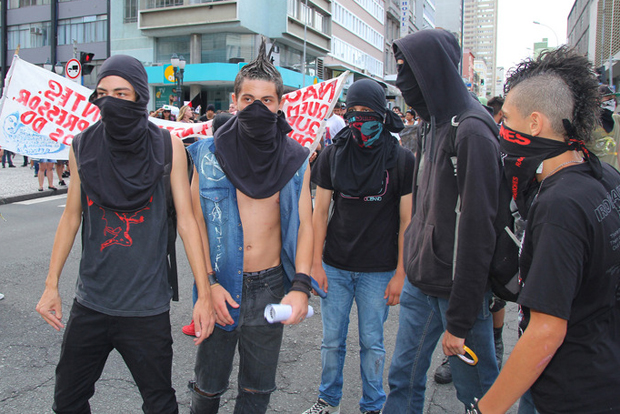5 Feb 2014 | Brazil, News, Politics and Society

In Curitiba, about 300 protesters took to the streets of the central city asking for more health and safety improvements in the country and against the hosting of the World Cup 2014 in Brazil. Photo: João Frigério / Demotix
In the wake of mass protests sparked by rising transport fares in 2013, Brazil has embraced measures aimed at containing protests. One of the most controversial bans the use of masks during demonstrations.
Approved by the governor of Rio de Janeiro, Sergio Cabral, Act 6.528 stipulates that it is “especially forbidden” to wear masks or other means to prevent identification of protesters. The criminalization of masks was also adopted by the state of Pernambuco and cities across the country without legislative consideration. Act 6.528 also contains a provision that requires telephone companies and internet service providers to respond within 24 hours to police requests for information about masked demonstrators that have been arrested.
The Rio de Janeiro law not only prohibits masks: hoods, scarves or anything that hides the face of demonstrators is likely to draw the attention of security services. Protesters who refuse to remove their mask are taken to a police station to be photographed and fingerprinted for identification.
While violence was limited to small groups during the mass protests that target social inequality, official corruption and the staggering cost of the 2014 Brazil World Cup venues, the Brazilian media has routinely showed photos of masked participants and labelled them as “vandals”, “rioters” and “anarchists”.
Authorities say the mask ban is justified and necessary to protect public and private property from “criminals” and in the name of “public safety”. But some Brazilian lawyers say the ban is a fundamental violation of civil rights and is a dangerous precedent for the country’s democracy.
Specifically, legal specialists say, the prohibition violates Article 5 of Brazil’s federal constitution. In September, the National Human Rights Commission of the Ordem dos Advogados do Brazil challenged the mask ban in court. Another legal challenge has been filed in Rio de Janeiro state as the law “prevents the citizen’s right to free expression”. So far, neither challenge has had any effect.
Human rights organizations claim that the prohibition is an extreme violation of freedom of expression and charge the government with authoritarian motives. Amnesty International has called on the government to respect the right to protest, and halt the arbitrary arrests and criminalization of protester, since the actions are a violation of Brazil’s constitution. Further, Amnesty says, the ban endangers the fundamental principles of a democratic state and are “typical of authoritarian regimes”.
In late January, demonstrations against the World Cup took place in 14 cities – led by hundreds of masked protesters. In Sao Paulo alone, more than a 100 people were arrested. One unmasked protester, Fabrizio Proteus, was shot twice and interrogated by police officers while he was still in intensive care. Activists claim the interrogation and the information he provided was illegal.
For her part, Brazil’s president, Dilma Rousseff, who is worried about elections, is backing an extensive advertising campaign to defend the World Cup. Public spending on the event has topped 8 billion Reais or £2.032 billion. Critics of the government spending have formed a movement under the banner of “Nao Vai Ter Copa”, “No World Cup”, to cause agitation against the games. The president’s advisors say new mass protests may have a negative impact on her re-election plans. In 2013, Rousseff’s popularity ratings fell over 20 per cent during the protests.
In the meantime, the Federal Police and the Agência Brasileira de Inteligência (Brazilian Intelligence Agency – Abin) are scanning the internet, especially on social networks, in search of “agitators” and suspects.
Everything indicates that repression has just begun.
This article was originally published on 5 February 2014 at indexoncensorship.org
11 Nov 2013 | Americas, News

While president Cristina Fernández de Kirchner’s government took a hit during midterm elections, Argentina’s supreme court ruled her restrictions on the country’s media were constitutional. (Photo: Claudio Santisteban / Demotix)
The Argentinian supreme court recently ruled to uphold the country’s controversial media law. The decision represents a big victory for President Cristina Fernández de Kirchner, who argued that the law helps break up the power concentrated in the hands of Argentina’s biggest media conglomerate Grupo Clarín. Opponents, however, says it stifles freedom of expression and press as it would force media companies to sell off some of their outlets. Concerns have also been raised about the law being a way of punishing Clarín, which fell out with the government after negative coverage during tax protests in 2008.
This is only the latest chapter in the ongoing story of the media business in some Latin American countries, with left wing governments and private companies locked in a decade-long fight for control of what will be shown on TV, heard on the radio, printed in newspapers, and posted on websites. New communications laws, persecution of journalists and closure of television networks, however, shows who is really in charge.
Governments like Venezuela and Argentina are waging war against big media companies, while more moderate ones, like Brazil, are using milder means to try and balance the power of communication in their countries. But far from being presented as a straightforward issue of freedom of expression, most of these cases have two opposing and radical interpretations.
On one side, there is the pro-government camp. They believe the governments are democratising the media, which has traditionally been in the hands of the few. In Brazil, for example, eight families control almost 80% of all traditional media companies. The aforementioned Grupo Clarín owns national and regional newspapers, radios, TV channels and more.
Those opposing these measures, however, say they amount to censorship. Again, a good example comes from Argentina: there are some rumours that Kirchner’s administration is trying to suffocate Grupo Clarín by not allowing big chain stores to advertise in their papers. There is also the infamous case of the the closure of Venezuela TV channel RCTVI in 2010.
Both sides talk of freedom of expression, arguing they want to show what is better for the public. But the public – those with the most to benefit from a good and transparent media – are not being allowed to decide for themselves. This is not happening just in Argentina and Venezuela, but across the continent – in Ecuador, Nicaragua and Bolivia, and, albeit in a much gentler way, in Brazil.
Professor Mirta Varela, specialist in history of the media at the University of Buenos Aires, is among those who believe governments are not repressing the big companies or trying to dominate the industry. “The measures taken have shown the political and economic power of the main companies, the spurious origin of their economic growth and their relationship with the dictatorship”, she explains, referencing Grupo Clarín and the military regimes that held power in almost all the Latin American countries from 1960 to 1980. But she also sees some problems with this polarisation: “There is a little room to set a new agenda; to make independent criticism, not overtly for or against the government.”
Cecilia Sanz works for Argentinian TV show “Bajada de línea”, which roughly translates to “Under the Line”. The show is hosted by Uruguayan Victor Hugo Morales, a well-known journalist connected to what Sanz calls “the progressive governments” in Latin America. Here she groups together a number of different left-leaning governments from across the continent – from moderates Lula da Silva and Dilma Rousseff in Brazil, to the more radical Evo Morales in Bolivia and Rafael Correa in Ecuador.
The show comments on the state of the media in Latin America, mainly arguing against the big private companies. “Our main goal is to put in context and show how the media owners have the intention, above all else, to accomplish their economic objectives,” she says. “The are using ‘freedom of expression’ as an excuse for this”. She mentions the case of powerful Mexican TV Azteca, which according to her, supports all the candidates from the hegemonic party PRI, and Chilean paper “El Mercurio”, which used to attack Chilean ex-president Salvador Allende in the 1970s – again putting very different cases in the same group.
The more radical of these “progressive governments” accuse the media industry of trying to destabilise the authorities or to encourage coups d’état. Venezuela’s putsch in 2002 is always mentioned. In this case factions of the media was directly fighting against Hugo Chávez – so Chávez took them off the air.
“This is an insult to the audience because in all of cases it is about the most popular media channels”, counters Claudio Paolillo, president of the freedom of press and expression commission of SIP, Sociedad Interamericana de Prensa (the Inter-American Press Society). “No one has put a gun to the audience’s head to force them to choose what to read, listen or watch, and on what channel.”
Paolillo says the government engages in “Goebbels’ style” propaganda, sustained by public resources, to oppress independent or critic media and journalists. He adds that, ironically, these radical “progressive governments” act like the conservative military regimes of the past. “It is an ideological posture. They want to nationalise communications media as if it was a regular business that offers services or products.”
Paolillo says SIP is against Latin Americas state-controlled monopolies or oligopolies, but reaffirms it is the audience that has the real power to decide what to watch, and where. If they want to watch the same news program, the government shall not interfere. “Unfortunately in Argentina as in Venezuela (and we must add here Ecuador, Nicaragua and Bolivia), governments have created their own media companies, expropriated and bought private ones – in some cases even working through a figurehead”, he complains.
Brazilian political scientist Mauricio Santoro brings up another common problem in the region – organised crime targeting reporters in Mexico and Colombia. But he says this is not a new situation. In his opinion, what is new, is “progressive governments” using the power of the state to control its opponents.
“The alternative proposed by these leftist governments is not based on the construction of an alternative model that privileges pluralism and gives a voice to social and community movements. It is about breaking business groups and giving power to a state press that acts like a government representative and not a public one.”
Worried about the poor quality of the media across Latin America, Santoro suggests the continent needs a more dynamic media, more capable of listening and understanding the true necessities of the people of a region going through “profound change”.
“Looking at the local scene”, he asks, “are we able to find any country where the traditional media meets this expectation?”
Not really.
This article was originally posted on 11 Nov 2013 at indexoncensorship.org
4 Nov 2013 | Digital Freedom, News

We can partially blame gerrymandering for the current gridlock in the U.S. Congress. By shaping the electoral map to create politically safe spaces, we have generated a fractious body that often clashes rather than collaborates, limiting our chances of resolving the country’s toughest challenges. Unfortunately, revelations about the global reach of American security surveillance programs under the National Security Agency (NSA) are leading some to propose what amounts to gerrymandering for the internet in order to route around NSA spying. This will shackle the internet, inherently change its technical infrastructure, throttle innovation, and likely lead to far more dangerous privacy violations around the globe.
Nations are rightly upset that the communications of their citizens are swept up in the National Security Agency’s pervasive surveillance dragnet. There is no question the United States has overreached and violated human rights in its collection of communications information on innocent people around the globe; however, the solution to this problem should not, and truly cannot, be data localization mandates that restrict data storage and flow.
The calls for greater localization of data are not new, but the recent efforts of Brazil’s President, Dilma Rouseff, to protect Brazilians from NSA spying reflected the view of many countries suddenly faced with a new threat to the privacy of the communications of their citizens. Rouseff has been an advocate for internet freedom, so undoubtedly her proposal is well intentioned, though the potential unintended repercussions are alarming.
First, it’s important to consider the technical reasons why data location requirements are a really bad idea. The Internet developed in a widely organic manner, creating a network that allowed data to flow from all corners of the world – regardless of political boundaries, residing everywhere and nowhere at the same time. This has helped increase the resilience of the internet and it has promoted significant efficiencies in data flow. As is, the network routes around damage, and data can be wherever it best makes sense and take an optimal route for delivery.
Data localization mandates would turn the internet on its head. Instead of a unified internet, we would have a fractured internet that may or may not work seamlessly. We would instead see districts of communications that cater to specific needs and interests – essentially we would see Internet gerrymandering at its finest. Countries and regions would develop localized regulations and rules for the internet to benefit them in theory, and would certainly aim to disadvantage competitors. The potential for serious winners and losers is huge. Certainly the hope for an internet that promotes global equality would be lost.
Data localization may only be a first step. Countries seeking to keep data out of the United States or that want to exert more control over the internet may also mandate restrictions on how data flows and how it is routed. This is not far-fetched. Countries such as Russia, the United Arab Emirates, and China have already proposed this at last year’s World Conference on International Telecommunications.
As internet traffic begins to demand more bandwidth, especially as we witness more real-time multimedia applications, efficient routing is essential to advance new internet services. High capacity applications like Apple’s FaceTime may slow to the painful crawl reminiscent of the dial-up days of the internet.
This only begins to illustrate the challenges internet innovators would face, but big established players like Facebook, Google and Microsoft, would potentially have the resources to abide by localization mandates – of course, only if the business case supports working in particular locales. Some countries with local storage rules may be bypassed altogether. For small or emerging businesses, data localization requirements would be a greater challenge. It would build barriers to markets and shut off channels for innovation. Few emerging businesses could afford to locate servers in every new market, and if local data server requirements become ubiquitous, it will be businesses in emerging markets that are most disadvantaged. The reality for developing nations is that protectionist measures such as data localization will further isolate local business from the global market, depriving them of the advantages for growth that are provided by the borderless internet.
Most important though, is the potential for fundamental harm to human rights due to data localization mandates. We recognize that this is a difficult argument to accept in the wake of the revelations about NSA surveillance, but data localization requirements are a double-edged sword. It is important to remember that human rights and civil liberties groups have long been opposed to data localization requirements because if used inappropriately, such requirements can become powerful tools of control, intimidation and oppression.
When companies were under intense criticism for turning over the data of Chinese activists to China, internet freedom activists were united in theirs calls to keep user data out of the country. When Yahoo! entered the Vietnamese market, it placed its servers out of the country in order to better protect the rights of its Vietnamese users. And the dust up between the governments of the United Arab Emirates, Saudi Arabia, India, and Indonesia, among others, demanding local servers for storage of BlackBerry messages in order to ensure legal accountability and meet national security concerns, was met with widespread condemnation. Now with democratic governments such as Brazil and some in Europe touting data localization as a response to American surveillance revelations, these oppressive regimes have new, albeit inadvertent, allies. While some countries will in fact store, use and protect data responsibly, the validation of data localization will unquestionably lead to many regimes abusing it to silence critics and spy on citizens. Beyond this, data server localization requirements are unlikely to prevent the NSA from accessing the data. U.S. companies and those with a U.S. presence will be compelled to meet NSA orders, and there appear to be NSA access points around the world.
Data localization is a proposed solution that is distracting from the important work needed to improve the Internet’s core infrastructural elements to make it more secure, resilient and accessible to all. This work includes expanding the number of routes, such as more undersea cables and fiber runs, and exchange points, so that much more of the world has convenient and fast Internet access. If less data is routed through the U.S., let it be for the right reason: that it makes the Internet stronger and more accessible for people worldwide. We also need to work to develop better Internet standards that provide usable privacy and security by default, and encourage broad adoption.
Protecting privacy rights in an era of transborder surveillance won’t be solved by ring fencing the Internet. It requires countries, including the U.S., to commit to the exceedingly tough work of coming to the negotiating table to work out agreements that set standards on surveillance practices and provide protections for the rights of privacy and free expression for people. Germany and France have just called for just such an agreement with the U.S. This is the right way forward.
In the U.S., we must reform our surveillance laws, adopt a warrant requirement for stored email and other digital data, and implement a consumer privacy law. The standards for government access to online data in all countries must likewise be raised. These measures are of course much more difficult in the short run that than data localization requirements, but they are forward-looking, long-term solutions that can advance a free and open internet that benefits us all.
Joseph Lorenzo Hall, Chief Technologist at Center for Democracy and Technology, co-authored this piece with Leslie Harris.
This article was originally posted on 4 Nov 2013 at indexoncensorship.org
13 Aug 2013 | Brazil, News, Politics and Society, Religion and Culture

Midia Ninja is a two-year-old media collective in Brazil that has risen to prominence for its reporting during mass demonstrations. (Photo: Midia Ninja)
Holding to their motto of “independent narratives, journalism and action”, a group of young journalists called Mídia Ninja (Ninja Media) used the recent demonstrations in Brazil’s major cities as a stage for their guerilla approach to journalism, using smartphones and social media platforms to reach their audience.
Mídia Ninja was formed two years ago as a hub for independent journalists in Brazil to tell stories with a social twist that traditional media was not covering. Until June this year, the group had 20 people working full time in six of Brazil’s major cities – São Paulo, Rio de Janeiro, Salvador, Belo Horizonte, Porto Alegre and Fortaleza.
“We’re interested in showing the ‘B-side’ of things, exploring different narratives”, says Rafael Vilela, a Mídia Ninja member from São Paulo.
The group came to prominence in June, when they did onsite reporting and live streaming of the mass demonstrations in São Paulo and Rio against rising transport fares that evolved into a movement against the status quo. Being at the core of the action, they were able to shoot and broadcast on their Facebook page some of the most graphic videos of the clashes between protesters and the police.
Using smartphones and cameras, Mídia Ninja’s members mixed with the protesters, and ended up being targeted by the police as well. Three of them were arrested in Rio in July 22nd, during a demonstration against Governor Sergio Cabral.
This demonstration was the point where Mídia Ninja’s work drew the attention of mass audiences. Rede Globo, Brazil’s biggest TV network, showed the group’s interview with protester Bruno Ferreira Telles, who was arrested on the 22 July protest for allegedly throwing incendiary bombs against the police, and was charged with attempted murder.
In his interview, Bruno claimed he was innocent and urged Mídia Ninja to retrieve a video documenting he ran from the police with nothing in his hands – until then, police claimed he carried incendiary bombs when arrested. The video of barehanded Bruno being chased and detained was shown by Globo, and it helped his case. All charges against Bruno have been dropped.
Their work during the demonstrations raised Mídia Ninja’s profile in Brazil, especially through social media. The group’s Facebook page, which now is their main platform, grew from a little over 2,000 fans before June to more than 160,000, and their network of collaborators grew to more than 2,000 people.
“We’re still figuring out how to organize our collaborators work, because it’s so many people”, says Vilela.
The central core of Mídia Ninja is a group of one hundred people gathered in Brazil’s main urban areas. They have no salary: most of their expenses ares paid by Fora do Eixo (Out of the Axis), a network of cultural producers that began by financing independent music festivals in Brazil’s smaller urban areas, and ended up organizing bigger events related to film, music, visual arts and street art.
Most of Mídia Ninja’s members come out of journalism workshops created by Fora do Eixo, and some of them live at São Paulo’s Casa Fora do Eixo, a house where the network’s members can live and work as a community, sharing expenses.
After the street demonstrations became less massive, Mídia Ninja moved forward to cover other social issues like indigenous peoples’ rights. Their goal is to broaden their work.
“Since June we’ve been very focused on the demonstrations, but that’s not the only thing we want to do. There are many things to be written about – in culture, in sports, in daily life”, says Vilela.
Now Mídia Ninja’s main goal is to launch crowdfunding campaigns to support their activities – like launching a website, which is on the way.
Mídia Ninja is not free of criticism. One of their soft spots is precisely their closeness to Fora do Eixo. Many artists accuse Fora do Eixo and its coordinator Pablo Capilé of profiting at their expense, and also of exploiting young activists to work for the network for free.
Some media specialists even dispute if the work Mídia Ninja does should be seen as journalism, because of the way they become participants of the events they were supposed to report.
Digital Journalism professor Marcelo Träsel from PUCRS University in Porto Alegre, for example, says there seems to be a “promiscuous relation” between Mídia Ninja’s journalists and their objects.
“The fact that Mídia Ninja members were arrested alongside demonstrators shows that maybe they are exceeding their role of ‘eyewitness of facts’ that journalists so often claim.”
In the other hand, Träsel concedes that, for not playing the “impartiality card” that became common among big media, Mídia Ninja should be regarded differently than most outlets.
“It’s unfair to judge (Mídia Ninja’s) practices using the ethical code that operates in more traditional newsrooms. The question here is to know to which extent Mídia Ninja’s audience is conscious of the difference between their model and the one from big media, and to recognize the filters this audience uses when they get information from one and from the other”.
This article was originally published on 13 Aug, 2013 at indexoncensorship.org | Index on Censorship: The voice of free expression




